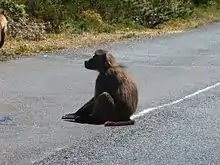baboon
English

A baboon
Alternative forms
Variant spellings[1]
- (14th century):
- babewyne
- baboyne
- (15th century):
- babewen
- babewin
- babewyn
- babwen
- babwyn
- baubyn
- (16th century):
- baboon
- baboone
- babound
- baboune
- baboyn
- babwyne
- (17th century):
- baboon
- baboone
- baboune
- (18th century–present):
- baboon
Etymology
From Middle English babewin, baboin, from Old French babouin, from baboue (“grimace; muzzle”), of Germanic origin, related to German dialectal Bäppe (“lips; muzzle”), Middle High German beffen (“to bark”), Middle English baffen (“to bark”). See also baff, baffle.
Pronunciation
- (Received Pronunciation) enPR: bəbo͞onʹ, IPA(key): /bəˈbuːn/,[1]
- (US) IPA(key): /ˌbæˈbuːn/
Audio (US) (file) - Rhymes: -uːn
Noun
baboon (plural baboons)
- An Old World monkey of the genus Papio, having dog-like muzzles and large canine teeth, cheek pouches, a short tail, and naked callosities on the buttocks.
- 1971: Philip José Farmer, Down in the Black Gang: and others; a story collection, page 79 (Nelson Doubleday)
- Mix swallowed the comment he wanted to make, that the council hall stank like a congress of baboons. But he was in no position to insult his host, nor should he. The man was only expressing the attitude of his time.
- 2012 March-April, John T. Jost, “Social Justice: Is It in Our Nature (and Our Future)?”, in American Scientist, volume 100, number 2, page 162:
- He draws eclectically on studies of baboons, descriptive anthropological accounts of hunter-gatherer societies and, in a few cases, the fossil record.
- 1971: Philip José Farmer, Down in the Black Gang: and others; a story collection, page 79 (Nelson Doubleday)
- (colloquial, derogatory) A foolish or boorish person.
Usage notes
The collective noun for baboons is troop.
Translations
primate
|
|
References
- “baboon” listed in the Oxford English Dictionary, second edition (1989)
This article is issued from Wiktionary. The text is licensed under Creative Commons - Attribution - Sharealike. Additional terms may apply for the media files.